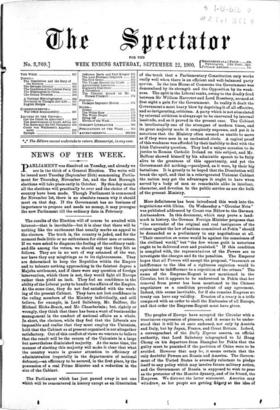The Parliament which has just passed away is not one
which will be remembered in history except as an illustration of the truth that a Parliamentary Constitution only works really well when there is an efficient and well-balanced party system. In the late House of Commons the Government was demoralised by its strength and the Opposition by its weak- ness. The split in the Liberal ranks, owing to the deadly feud between Sir William Harcourt and Lord Roeebery, seemed at first eight a gain for the Government. In reality it dealt the Government a most heavy blow by depriving it of all effective, and so invigorating, criticism. A party which is not stimulated by external criticism is always apt to be enervated by internal lassitude, and so it proved in the present case. The Cabinet is intellectually one of the strongest of modern times, and its great majority made it completely supreme, and yet it is notorious that the Ministry often seemed as unable to move as if they were men in an enchanted circle. A capital proof of this weakness was afforded by their inability to deal with the Irish University question. They had a unique occasion to do justice to Roman Catholic Ireland on this subject, and Mr. Balfour showed himself by his admirable speech to be fully alive to the greatness of this opportunity, and yet the Government did nothing,—paralysed, as it were, by their big battalions. It is greatly to be hoped that the Dissolution will break the spell, and that in a reinvigorated Unionist Cabinet the nation may get the advantages it ought to have when served by a body of men so remarkable alike in intellect, character, and devotion to the public service as are the bulk of the present Ministry.






































